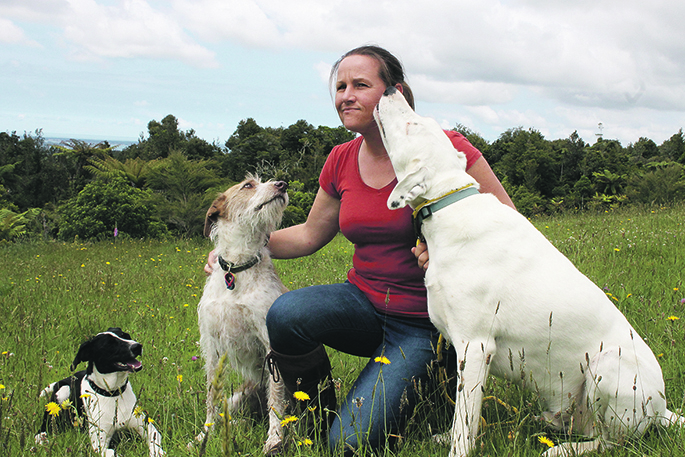However, says Estelle, relationships can be significantly improved and enhanced by understanding a dog’s characteristics and the environment in which it lives.
“Sometimes people have chosen completely the wrong dog for their home or their own personalities and the best thing to do is re-home the dog. Some dogs just don’t make good pets but the traits that are a problem in a domestic situation may be an asset in a working role such as search and rescue or police work.”
In many other cases, a separation isn’t necessary and Estelle can help dog and owner learn to enjoy each other’s company.
Abilities recognised
Opening owner’s eyes to their pet’s abilities can be done on a one-to-one basis to help behaviour change, or by involving dogs and owners in one of the many courses Estelle runs through her business Allsorts Dog Training.
Her aim is that owners gain an insight into a dog’s world and appreciate that dogs, whatever size or breed, are intelligent animals which need mental as well as physical stimulation.
Among the most enjoyable ways of getting owners and dogs in tune, are ‘scent work’ and ‘nose work’ during which dogs learn to track following a specific scent, or find objects infused with an odour.
“These courses are designed to be fun and enable dogs and owners to work together. Scent work is also an ideal indoor activity if the weather’s too bad to go for a walk and 20 minutes of scent work is as valuable as a 40 minute walk for the dog.
Enjoyable exercises
“And yes, you can teach an old dog new tricks. Owners are constantly surprised and impressed at just what their dogs can do when given the opportunity.”
While the courses Estelle teaches are designed to be enjoyable and not competitive, there are regional and national competitions for scent and nose work for owners keen to take their training to another level.
“It’s not necessarily the biggest dogs or the breeds you would think most suited to scent work that are the most efficient. Sometimes tiny Bichon Frise can out-do a big hound in the tests.”
Dog owners are often astounded to see their pets seek out a scented object in a room or car, or follow a scent trail, much as highly-trained drug and police dogs do.
“They also come to understand that a dog’s world is the world of scent, not the visual world which we experience. A dog’s sense of smell is so acute it can detect a drop of blood in a body of water the size of that in two Olympic swimming pools.”
Estelle grew up in Kent in the UK on a small farm with livestock and sheep dogs. “I always loved dogs but when I went to university I studied geology as the environment is my other interest.”
Animal rescue
When she graduated, Estelle worked for the ’Head of Rehoming’ at a branch of Battersea Dogs and Cats Home animal rescue for eight years.
It was in this role that Estelle discovered many serious behavioural issues were resolved when she found the dog’s natural working talent and focused on developing those attributes. As a result she managed to successfully rehome many dogs as pets as well as in working roles with the armed forces, biosecurity and as assistance dogs.
While Estelle has a natural ability to understand and assess the characteristics and behaviour of dogs, it was Brock, the rescue collie she adopted, who taught her most about dogs, she says.
“He was a natural leader and would teach many other foster dogs what being a dog is all about. It was a true insight into seeing how dogs influence each other and build relationships.”
Search and rescue
The next big learning step for Estelle was qualifying with her collie Rush, as operational Search Dog Handler with a Search and Rescue Dog Unit. The pair went on to be involved in scores of operations to find missing people, mainly in low-land and urban areas. “It was demanding and at times exhausting work but also immensely rewarding, especially when the outcome was positive.”
When Estelle moved to New Zealand seven years ago, Rush came with her. He’s now retired but still loves tracking for fun.
“I had visited New Zealand many times and it felt so much like home I decided to move here permanently,” says Estelle who, 18 months ago, bought a lifestyle block just south of Katikati.
There 11-year-old Rush is joined by a seven-year-old rescue Pointer/Greyhound cross called Honey, and a one-year-old rescue heading dog. Estelle also fosters rescue dogs and is currently training a young, deaf cross-breed dog called Snow. There are two horses, a family of goats and a small number of chickens, which serve as ‘teachers’ for dogs who have a tendency to want to eat the birds.
As with all her training techniques, Estelle uses reward and positive reinforcement to deter hen-eating. “My dogs leave the hens alone. They know if they do, their reward will be an egg to eat – not a bird.”



0 Comments
Leave a Comment